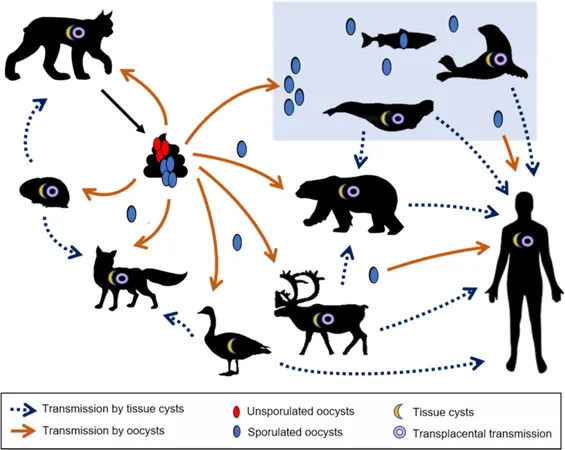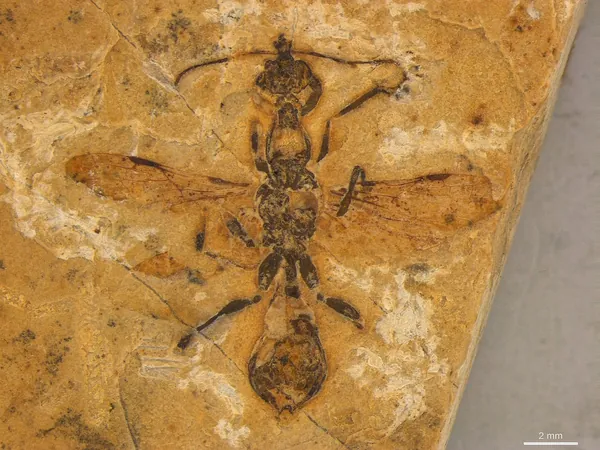
Unveiling the Perils: How Climate Change is Fueling the Spread of Infectious Diseases in the Arctic
2025-04-07
Author: William
Introduction
As climate change continues to reshape our planet, its consequences are becoming increasingly dire, particularly in the Arctic region. A recent study by an extensive international consortium of experts warns that this environmental crisis is facilitating the spread of infectious diseases and the release of ancient microbes long locked in permafrost, potentially posing grave risks to human and animal health.
Research Findings
Published in the Science of the Total Environment, the research highlights how the rapid melting of Arctic ice is opening up previously untouched areas, leading to an influx of industrial activities and human populations. This increased interaction with the environment has raised alarming concerns about zoonotic diseases, which are capable of jumping from wildlife to humans. Diseases such as brucellosis, tularemia, and even E. coli could become more prevalent as these once isolated ecosystems become more accessible.
Dr. Khaled Megahed Abass from the University of Sharjah and co-author of the study stated, “The thawing of the permafrost could release ancient bacteria or viruses that have been encased in ice for millennia." This statement underscores the chilling reality that alongside modern-day pathogens, we may be unearthing diseases that humanity has not encountered for centuries.
The Need for Proactive Measures
The researchers have emphasized the critical need for communities in the Arctic to bolster their awareness and management strategies regarding emerging infectious diseases, which may find fertile ground as habitats shift and ecosystems undergo drastic changes. They advocate for a proactive approach to public health that considers the close interdependence of human, animal, and environmental health—a concept encapsulated in the One Health framework.
Zoonotic Disease Threats
Particularly concerning is the fact that three-quarters of all known infectious diseases in humans are zoonotic. As the Arctic warms at a rate more rapid than the global average, changes within these ecosystems could facilitate cross-species transmission of pathogens more frequently. The interconnectedness of wildlife, human activities, and the environment presents a complex challenge, especially in a region that is witnessing both rapid industrialization and ecological degradation.
Implications Beyond the Arctic
The study reviewed an array of scientific literature and government documents pertaining to the Arctic regions of Canada, Alaska, Greenland, and Northern Europe, all revealing critical gaps in our understanding of health and environmental changes. Dr. Abass highlighted the importance of recognizing that the environmental stressors observed in the Arctic have broader implications, stating, “What is happening in the Arctic doesn’t stay in the Arctic.” The effects of climate change in these remote areas can ripple outward, influencing health and ecological systems worldwide.
Indigenous Communities and Local Knowledge
Notably, indigenous communities are already witnessing the impacts of these changes and have begun adapting. Their local knowledge is invaluable for monitoring early signs of health and ecosystem disturbances, and the authors emphasize the importance of incorporating this indigenous insight into larger health surveillance strategies.
Urgent Call to Action
As this alarming research sheds light on the consequences of climate change, it serves as a wake-up call to policymakers and health organizations. The study stresses the urgent need for enhanced disease surveillance, robust environmental monitoring, and climate-resilient public health infrastructures. It's a clarion call for cooperative action—calls for governments and communities globally to act before outbreaks can occur.
Conclusion
This alarming correlation between climate change and public health demands immediate attention. The future health of both people and wildlife in the Arctic hangs in the balance, and international cooperation will be essential in mitigating these risks. As awareness spreads, it's clear that the fight against climate change is not just an environmental issue but a critical public health concern that transcends borders.









 Brasil (PT)
Brasil (PT)
 Canada (EN)
Canada (EN)
 Chile (ES)
Chile (ES)
 Česko (CS)
Česko (CS)
 대한민국 (KO)
대한민국 (KO)
 España (ES)
España (ES)
 France (FR)
France (FR)
 Hong Kong (EN)
Hong Kong (EN)
 Italia (IT)
Italia (IT)
 日本 (JA)
日本 (JA)
 Magyarország (HU)
Magyarország (HU)
 Norge (NO)
Norge (NO)
 Polska (PL)
Polska (PL)
 Schweiz (DE)
Schweiz (DE)
 Singapore (EN)
Singapore (EN)
 Sverige (SV)
Sverige (SV)
 Suomi (FI)
Suomi (FI)
 Türkiye (TR)
Türkiye (TR)
 الإمارات العربية المتحدة (AR)
الإمارات العربية المتحدة (AR)